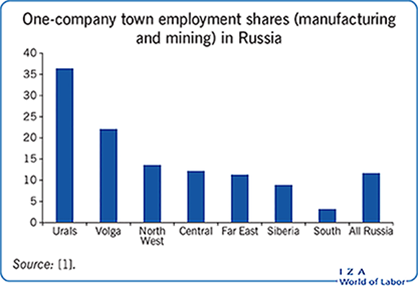Elevator pitch
One-company towns are a relatively rare phenomenon. Mostly created in locations that are difficult to access, due to their association with industries such as mining, they have been a marked feature of the former planned economies. One-company towns typically have high concentrations of employment that normally provide much of the funding for local services. This combination has proven problematic when faced with shocks that force restructuring or even closure. Specific policies for the redeployment of labor and funding of services need to be in place instead of subsidies simply aimed at averting job losses.

Key findings
Pros
- One-company towns help address resource constraints, notably in labor supply, for distant locations.
- One-company towns tend to provide relatively high levels of worker compensation that promote attachment.
- Employer benevolence, along with self-interest, has often been associated with high levels of service provision—including housing, education, and/or childcare.
- One-company towns have often been marked by good civic planning funded by a mix of private and public agencies.
Cons
- The susceptibility of one-company towns to shocks tends to be accentuated by specialization and limited other activity in the locality.
- Responsibility for funding of local services has often fallen on the company, with little regard for profitability, thereby rendering the town more vulnerable to shocks.
- Acquisition of highly firm-specific skills limits the outside opportunities of employees and their re-employment options in the face of closure and job losses.
- Lack of information about alternative employment options, as well as insufficient resources to enable mobility, have led to low labor mobility and flexibility.
Author's main message
The number of one-company towns has declined significantly over the last century. Even so, employment concentration remains a serious issue, particularly in the former planned economies. In these contexts, shocks can be hard to absorb, not least when large companies provide basic services and constitute the main fiscal base. When restructuring is required, governments tend to shy away from difficult decisions to avoid large spikes in local unemployment. Rather than drip-feeding fiscal subsidies, which may only prolong a firm's demise, policymakers should offer employee retraining and/or foster greater labor mobility via informational and fiscal support.
This article first appeared on IZA World of Labor in March 2018. Reproduced with permission


